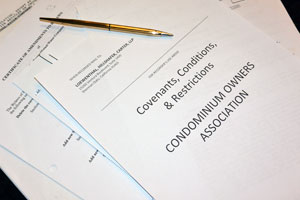LHC Newsletter, Vol. 8, No. 4
“NOT ALL MEETINGS ARE CREATED EQUALLY”
By: David A. Loewenthal
For those of us who have been involved in the homeowner association industry for a number of years, it is well understood that the purpose of the Open Meeting Act (Civil Code section 4925) is to ensure that most board meetings and transactions are to be conducted in the open and that they be transparent. Civil Code section 4925 states as follows: “Any member may attend meetings, except when the board adjourns to, or meets solely in, executive session. As specified in subdivision (b) of section 4090, a member of the association shall be entitled to attend a teleconference meeting or the portion of a teleconference meeting that is open to members, and that meeting or portion of the meeting shall be audible to the members in a location specified in the notice of the meeting.”
- Meeting Defined: Pursuant to Civil Code section 4090, a board meeting is any gathering of a majority of directors at the same time and place to hear, discuss, or deliberate upon any item of business that is within the authority of the board.
- Regular Board Meetings: Regular meetings of the board are either set by the governing documents or, if not, by the board of directors. As an example, a regularly standing meeting on the third Wednesday of each month.
o Note: Board’s must meet at least quarterly to perform financial reviews.
- Special Board Meetings: These meetings can be scheduled when the board needs to conduct business and such business needs to be conducted in advance of the next scheduled regular board meeting. The same type of notice required for regular board meetings apply to special board meetings with the exception of executive or emergency meetings. Special meetings can be called by either the president or any two (2) directors. (Corporations Code section 7211(a)(1)).
- Notice of Board Meetings: Civil Code section 4920 sets forth that the association shall give notice of the time and place of a board meeting at least four (4) days before the meeting, except as follows:
- The board meeting is an emergency meeting held pursuant to section 4923 in which case the association is not required to give notice of the time and place of the meeting;
- If a nonemergency board meeting is held solely in executive session, the association shall give notice of the time and place of the meeting at least two (2) days prior to the meeting;
- If the association’s governing documents require a longer period of time than is required by this section, the association shall comply with the period stated within the governing documents. Note: governing document provision does not apply to a notice of emergency meeting or meeting held solely in executive session unless it specifically states it applies to those types of meetings.
- Notice of a board meeting shall be given by general delivery pursuant to Civil Code section 4045.
- General Delivery/General Notice: Pursuant to Civil Code section 4045 notice can be provided by one or more of the following methods:
- Any method provided for delivery of an individual notice pursuant to section 4040;
- Inclusion in a billing statement, newsletter or other document that is delivered by one of the methods provided in this section;
- Posting the printed document in a prominent location that is accessible to all members, if the location has been designated for the posting of general notices by the association in the annual policy statement, prepared pursuant to section 5310;
- The association’s broadcast television programming for the purposes of distributing information on association business to its members, by inclusion in the programming.
o Please note that if a member requests to receive general notice by individual delivery, all general notices to that member, given under this section, shall be delivered pursuant to section 4040. This includes first class mail, registered or certified mail, or overnight delivery. In addition, email is allowed if owner has consented in writing.
- Meeting Agenda: Pursuant to Civil Code section 4920 the agenda of the board meeting must be provided along with the notice of the meeting. The association is allowed to post notices in an area that is prominent and accessible to all of its members. Items that are not identified on the agenda are not allowed to be discussed or any action taken on them.
The following exceptions, pursuant to Civil Code section 4930, apply to “limitations on meeting content.”
- Even if a Matter is Not on the Agenda, a Director, Managing Agent or other agent of the Board, or a Member of the Staff of the Board may do any of the Following:
- Briefly respond to statements made and questions posed by a person speaking at a meeting as described in subdivision (b) of section 4925;
- Ask a question for clarification, make a brief announcement, or make a brief report on the persons own activities, whether in response to questions posed by a member or based upon a person’s own initiative.
- Either reference to, or provide other resources for factual information through its managing agent or other agents or staff;
- Request its managing agent or other agents or staff to report back to the board at a subsequent meeting concerning any matter, or take action to direct its managing agent or other agents or staff to place the matter of business on a future agenda;
- Direct its managing agent or other agents or staff to perform administrative tasks where necessary to carry out this section.
Further, the board may take action on any item of business not appearing on the agenda under the following conditions:
- In the event that the majority of a board present at a meeting determines that an emergency situation exists where there are circumstances that could have not have been reasonably foreseen by the board, that require immediate attention or action by the board, and that, by necessity, make it impractical to provide notice.
- Upon a determination made by the board by a vote of two-thirds (⅔) of the directors present at the meeting, or, if less than two-thirds (⅔) of the total membership of the board is present at the meeting, by unanimous vote of the directors present that there is a need to take immediate action and that the need for action came to the attention of the Board after the agenda was distributed;
- The item appeared in the agenda that was distributed pursuant to section 4920(a) for a prior meeting of the board that occurred not more than thirty (30) calendar days before the date the action is taken on the item and, at the prior meeting, action of the item was continued to the meeting at which the action is taken.
- Quorum: Pursuant to Corporations Code section 7211(a)(7), a majority of the number of directors authorized in or pursuant to the articles or bylaws constitutes a quorum of the board for the transaction of business.
It should be noted that a vacancy on the board does not change the quorum requirements. As an example, if the board consists of seven (7) directors then four (4) directors must be present to have quorum. Thus, if three (3) directors resign, quorum is still four (4) members. If four (4) members resign then you could not reach a quorum for purposes of conducting a meeting. If a majority of Directors are no longer on the board due to resignation or death, then, the remaining board members can appoint to fill the vacant board seats as long as the bylaws do not require that a special election of the membership be conducted to fill such vacancy.
- Who May Attend a Meeting: Generally speaking, only members are allowed to attend board or membership meetings pursuant to Civil Code section 4925. Generally, membership is tied to an ownership interest in the property. Some associations allow individuals, other than members, to attend though there is no requirement to do so. Such exceptions may include, but not necessarily be limited to:
- A spouse who is not a member;
- Tenant/renters.
- Executive Session: Members do not have a right to attend executive sessions pursuant to Civil Code section 4935. The board may go into executive session, as follows:
- The board may adjourn to, or meet solely, in executive session to consider litigation, matters relating to the formation of contracts with third parties, member discipline, and personnel matters or to meet with the member, upon the member’s request, regarding the members payment of assessments, as specified in section 5665.
- The board shall adjourn to, or meet solely, in executive session to discuss member discipline, if requested by the member who is the subject of the discussion. That member shall be entitled to attend the executive session.
- The board shall adjourn to, or meet solely, in executive session to discuss the payment plan pursuant to section 5665.
- The board shall adjourn to, or meet solely, in executive session to decide whether to foreclose on a lien pursuant to subdivision (b) of section 5705.
Please note that any matter discussed in executive session shall be generally noted in the minutes immediately following the meeting that is open to the entire membership.
- Conducting an Executive Session Meeting: Executive session meeting can be held in person or via telephone/video conference (Corporations Code section 7211(a).
- Notice of Executive Session: Executive session meetings must be noticed at least two (2) days in advance of the date of the scheduled meeting. Civil Code section 4920.
- Emergency Meetings: Pursuant to Civil Code section 4923 an emergency board meeting is defined as follows: “An emergency board meeting may be called by the president of the association, or by any two (2) directors other than the president, if there are circumstances that could not have been reasonably foreseen which require immediate attention and possible action by the board, and which by necessity makes it impractical to provide notices required by section 4920.”
o The board is not obligated to post notice or an agenda for an emergency meeting.
- Location of Emergency Meetings: Like an executive session meeting, an emergency meeting can be held in person at a physical location or by telephone/video conference. In addition, if there is unanimous written consent, an emergency meeting may be conducted via email (Civil Code section 4910(b)(2)). It should be noted that the requirement for unanimous written consent pertains to conducting the emergency meeting via email not what the ultimate decision or outcome of that emergency meeting actually is.
- Exception to what is a Board Meeting: It should be noted that simply because a quorum of board members gather does not automatically make that a board meeting subject to notice requirements. As examples, if a quorum of the board of directors gathers for social related purposes or attend an educational forum, unrelated to the conducting of business, it does not constitute a meeting.
- Parliamentary Procedure: Pursuant to Civil Code section 5000 entitled “Membership Meetings” this section states as follows: “(a) Meeting of the membership of the association shall be conducted in accordance with a recognized system of parliamentary procedure or any parliamentary procedure the association may adopt. (b) The board shall permit any member to speak at any meeting of the membership of the association. A reasonable time limit for all members to speak at a meeting of the association shall be established by the board.”
The most commonly used parliamentary procedure is Roberts Rule of Order. It should be noted that parliamentary procedure is not required for board or committee meetings. Again, Civil Code section 5000 is limited to membership meetings.
- Executive Committees/Delegating Duties: In many circumstances, boards may delegate certain duties to others including a community association manager to handle general day to day operations of the association.
An executive committee, pursuant to Corporations Code section 7212 must consist of at least two (2) or more members of the board of directors. They serve at the discretion of the board of directors. An executive committee, pursuant to Corporations Code section 7212, include areas such as dealing with litigation matters or matters that would otherwise be handled in executive session such as compensation of a vendor or a manager.
With respect to litigation committees, they are often used when the association is involved in a lawsuit. If the litigation committee is composed only of currently seated board members, then it would remain an executive committee; however, if non board members are appointed to the litigation committee then the litigation committee would not be considered an executive committee. A litigation committee can provide evaluations, analysis and report to the board its recommendations and findings.
- Architectural Committee: Generally identified in the associations CC&Rs and have the power to review and approve architectural submittals. If the architectural committee members are composed solely with members of the board then, in cases of a denial of an architectural application, the owner can be appeal to the board of directors.


